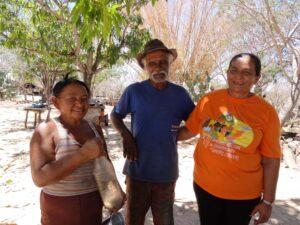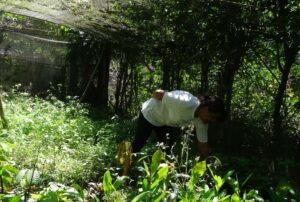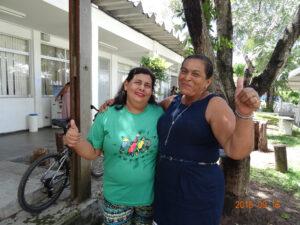The Power of Human Connection
This September, Grassroots International and our colleagues at IDEX (the International Development Exchange, soon to be known as Thousand Currents) participated in an amazing learning exchange in Brazil. Hosted by Grassroots’ partners, the Popular Peasant Movement (MCP) and Landless Workers Movement (MST), farmers and food justice activists from eight nations shared their knowledge, struggles and connections over 15 days.
Below is an article from Katherine Zavala, Latin America Program Director at IDEX, describing that connection.
The Power of Human Connection
For 15 days last month, I was part of a troupe of 12 participants from across the world (Mexico, Ghana, Guatemala, Guinea, Honduras, Peru, Senegal, South Africa) communicating across four languages to exchange and learn about food sovereignty and movement building in Brazil.
Beyond the exchanges of seeds, agroecology techniques, sustainable agriculture practices, and advocacy stories, what became my most valuable learning in Brazil was the power of human connection.
What happens when people let down their guard and dare to connect with each other on a deeper level?
These 15 days in Brazil — begun on the day that Brazil’s elected president Dilma Rousseff voted to be impeached by the Senate—gave me many moments to ponder this question and its role in movement building around the world.
Popular theater — youth integrating everyone
During the 7th National Seminar on Biodiversity and Creole Seeds hosted by Movimento Camponês Popular (MCP, or Popular Peasant Movement), I participated in a session on Popular Theater organized by MCP youth.
After a series of drama-based activities, we were invited to be part of the play. The piece was intended to portray both the critical political moment that Brazil was experiencing and the transformation a community member can go through when they become part of a social movement.
But there was one catch.
The play was going to be all in Portuguese.
We were asked, however, to use our own language as we played our roles. Turns out, the language didn’t matter, as we’re all facing the same challenges under neoliberal economic policies.
Not only was this session so much fun, it was also a testament to the youth’s care and thoughtfulness to ensure that we, non-Brazilians, felt part of the play. It was a simple way to make us feel connected.
When getting stuck was a blessing
As our group was heading down the road, to visit MCP rural communities, we found ourselves figuring out how was our van going to get out of a sand pit it had fallen into in the middle of a deserted area in the state of Goiais.
Coincidentally, our van was next to a path that led to a few thatch-roofed houses. Part of our group walked to the only one where people were home to get help. Hermegeniliu and his wife, Olicia, invited us in and showed us their home.
This couple had built themselves an integrated agriculture model that we learned about, where they grew various herbs and crops on a small scale, together with their cows and pigs. Olicia made rapadura, a popular candy made out of manioc, to sell in the closest markets.
When our group unexpectedly showed up at this couple’s front yard, their warm hospitality encouraged us to stay and rest. With such warmth and kindness, how could we not feel connected?
Campo Unitario — Movements united quickly
Landing in Brazil when Dilma’s impeachment was announced gave us an opportunity to witness how Brazil’s social movements immediately took action through their joint alliance. At the “United Camp” in Brasilia, they occupied the Ministry of Planning, Administration and Budget for three days to show the Temer government that the movements would be defending many public policies that social movements had fought for to protect human rights.
We witnessed how quickly social movements and labor unions communicated and organized their action plan to visibilize their concerns with the impeachment process. Even if their agendas were slightly different, at this crucial moment, existing relationships between social movements were leveraged at a national level. By uniting together on strategic actions, human connection was demonstrated via strength in numbers and rapid mobilization.
An MST member shares her garden and home

Fatima is an old time organizer who came to the Nova Panema settlement in rural Bahia 18 years ago to occupy the land and establish her life here. She has played many roles within the Movimento dos Trabalhadores Rurais Sem Terra (MST, or Landless Worker’s Movement) from being a member of the Commission in Gender and in Communications to being an Area Coordinator and an Agroecology Trainer. When we visited her home, she shared with us the collective agroecological garden she visits every day and proudly showed all the crops they were growing.
Originally, we were going to stay at separate homes of MST members, so that we each could have the experience of living with a family. But with four different languages in our group, it wasn’t going to work. Immediately, the MST members shifted and accommodated us in one room all together on the school grounds.
Language was not a barrier to Fatima though. She would come and visit us many times throughout our time at the settlement, and invited us to take a shower at her house anytime. She never missed an opportunity to have a conversation, sharing her stories of her participation in the MST. Fatima’s warmth fueled our human connections in Bahia.
Inclusion is…being asked to play a part
Our group was invited to be part of the Opening Ceremony of the Bahia state-level gathering of MST Educators. Three hundred of 800 MST Educators came to Salvador so that they could move forward with their curricula and training focused on agroecology and do a coyuntura, or a process of collective contextual analysis to help examine current political conditions and adapt their strategies to the realities on the ground.
Herschelle Milford from IDEX Partner Surplus People Project was invited to represent our group delegation at the ceremony. This felt truly special to be acknowledged that we all had traveled so far to learn from social movements in Brazil.
In her remarks, she shared that the struggles from around the world were one and that we all had a common force to fight against: neoliberal economic policies. At the end of her presentation, she called out the popular chant “Globalize the Struggle!” to which MST members responded, “Globalize the Hope!” The human connection was palpable in the room.
When words are just not enough
On our final day with MST, as our goodbyes began, emotion came over us and all we needed to express came only through our tears.
It has been such a full and joyful day learning from the black movements in Salvador, Brazil about their history, their ongoing struggles and their future plans to make their realities visible through the UN Decade of People of African Descent. This finalized an incredible journey of visiting MST encampments and settlements, their occupation in front of INCRA (National Institute of Colonization and Agrarian Reform), and ending with the connection between MST and the black movements in Salvador.

At the moment of appreciating each other for what we learned, for the experience we had and the relationships built, we realized that we were all there to unite in solidarity to make this world a better place. Above all we shared our love for life, and we were overcome with our human connection to each other.
